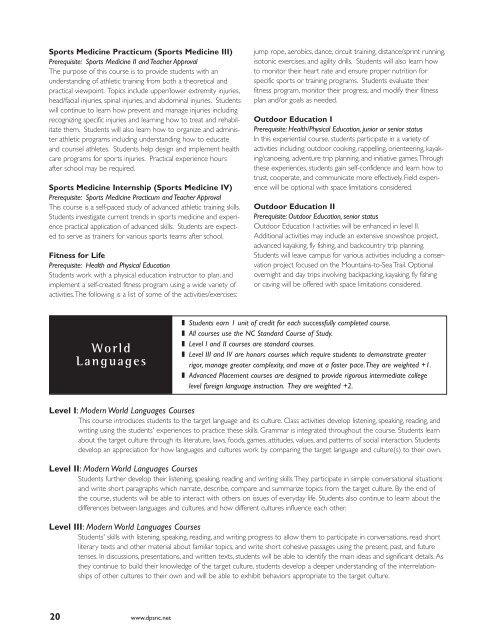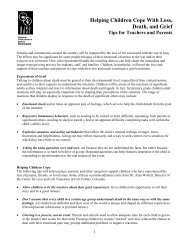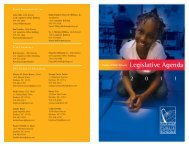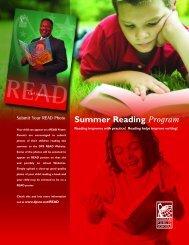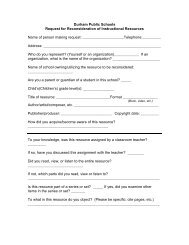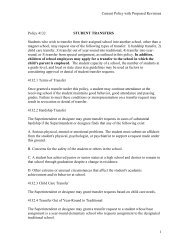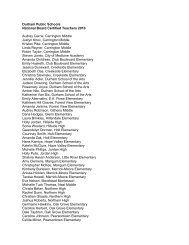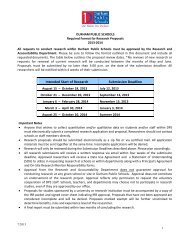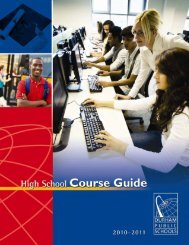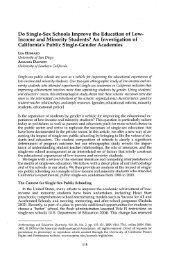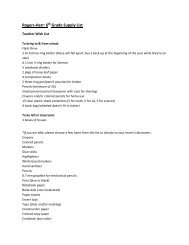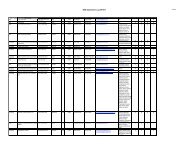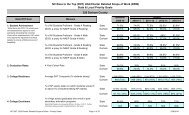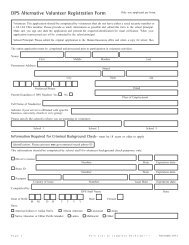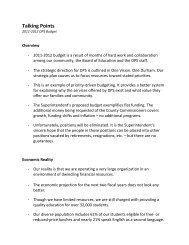2011-12 High School Course Offerings - Durham Public Schools
2011-12 High School Course Offerings - Durham Public Schools
2011-12 High School Course Offerings - Durham Public Schools
You also want an ePaper? Increase the reach of your titles
YUMPU automatically turns print PDFs into web optimized ePapers that Google loves.
Sports Medicine Practicum (Sports Medicine III)<br />
Prerequisite: Sports Medicine II and Teacher Approval<br />
The purpose of this course is to provide students with an<br />
understanding of athletic training from both a theoretical and<br />
practical viewpoint. Topics include upper/lower extremity injuries,<br />
head/facial injuries, spinal injuries, and abdominal injuries. Students<br />
will continue to learn how prevent and manage injuries including<br />
recognizing specific injuries and learning how to treat and rehabilitate<br />
them. Students will also learn how to organize and administer<br />
athletic programs including understanding how to educate<br />
and counsel athletes. Students help design and implement health<br />
care programs for sports injuries. Practical experience hours<br />
after school may be required.<br />
Sports Medicine Internship (Sports Medicine IV)<br />
Prerequisite: Sports Medicine Practicum and Teacher Approval<br />
This course is a self-paced study of advanced athletic training skills.<br />
Students investigate current trends in sports medicine and experience<br />
practical application of advanced skills. Students are expected<br />
to serve as trainers for various sports teams after school.<br />
Fitness for Life<br />
Prerequisite: Health and Physical Education<br />
Students work with a physical education instructor to plan, and<br />
implement a self-created fitness program using a wide variety of<br />
activities.The following is a list of some of the activities/exercises:<br />
jump rope, aerobics, dance, circuit training, distance/sprint running,<br />
isotonic exercises, and agility drills. Students will also learn how<br />
to monitor their heart rate and ensure proper nutrition for<br />
specific sports or training programs. Students evaluate their<br />
fitness program, monitor their progress, and modify their fitness<br />
plan and/or goals as needed.<br />
Outdoor Education I<br />
Prerequisite: Health/Physical Education, junior or senior status<br />
In this experiential course, students participate in a variety of<br />
activities including: outdoor cooking, rappelling, orienteering, kayaking/canoeing,<br />
adventure trip planning, and initiative games.Through<br />
these experiences, students gain self-confidence and learn how to<br />
trust, cooperate, and communicate more effectively. Field experience<br />
will be optional with space limitations considered.<br />
Outdoor Education II<br />
Prerequisite: Outdoor Education, senior status<br />
Outdoor Education I activities will be enhanced in level II.<br />
Additional activities may include an extensive snowshoe project,<br />
advanced kayaking, fly fishing, and backcountry trip planning.<br />
Students will leave campus for various activities including a conservation<br />
project focused on the Mountains-to-Sea Trail. Optional<br />
overnight and day trips involving backpacking, kayaking, fly fishing<br />
or caving will be offered with space limitations considered.<br />
World<br />
Languages<br />
❚ Students earn 1 unit of credit for each successfully completed course.<br />
❚ All courses use the NC Standard <strong>Course</strong> of Study.<br />
❚ Level I and II courses are standard courses.<br />
❚ Level III and IV are honors courses which require students to demonstrate greater<br />
rigor, manage greater complexity, and move at a faster pace.They are weighted +1.<br />
❚ Advanced Placement courses are designed to provide rigorous intermediate college<br />
level foreign language instruction. They are weighted +2.<br />
Level I: Modern World Languages <strong>Course</strong>s<br />
This course introduces students to the target language and its culture. Class activities develop listening, speaking, reading, and<br />
writing using the students' experiences to practice these skills. Grammar is integrated throughout the course. Students learn<br />
about the target culture through its literature, laws, foods, games, attitudes, values, and patterns of social interaction. Students<br />
develop an appreciation for how languages and cultures work by comparing the target language and culture(s) to their own.<br />
Level II: Modern World Languages <strong>Course</strong>s<br />
Students further develop their listening, speaking, reading and writing skills.They participate in simple conversational situations<br />
and write short paragraphs which narrate, describe, compare and summarize topics from the target culture. By the end of<br />
the course, students will be able to interact with others on issues of everyday life. Students also continue to learn about the<br />
differences between languages and cultures, and how different cultures influence each other.<br />
Level III: Modern World Languages <strong>Course</strong>s<br />
Students' skills with listening, speaking, reading, and writing progress to allow them to participate in conversations, read short<br />
literary texts and other material about familiar topics, and write short cohesive passages using the present, past, and future<br />
tenses. In discussions, presentations, and written texts, students will be able to identify the main ideas and significant details. As<br />
they continue to build their knowledge of the target culture, students develop a deeper understanding of the interrelationships<br />
of other cultures to their own and will be able to exhibit behaviors appropriate to the target culture.<br />
20 www.dpsnc.net


